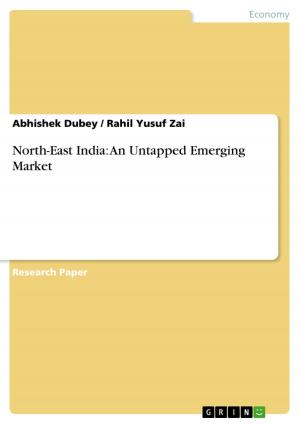Call of the Wild - Heroines in Canadian Women's Wilderness Fiction
Fiction & Literature, Literary Theory & Criticism| Author: | Kirstine Steno | ISBN: | 9783656126386 |
| Publisher: | GRIN Publishing | Publication: | February 10, 2012 |
| Imprint: | GRIN Publishing | Language: | English |
| Author: | Kirstine Steno |
| ISBN: | 9783656126386 |
| Publisher: | GRIN Publishing |
| Publication: | February 10, 2012 |
| Imprint: | GRIN Publishing |
| Language: | English |
Master's Thesis from the year 2012 in the subject Literature - Canada, University of Copenhagen, course: Canadian Literature, language: English, abstract: The purpose of this thesis is to determine how Canadian women writers have come to appropriate wilderness literature as a genre of their own. Feminist authors have transformed the traditional quest novels, in which male protagonists enter, tame and claim the virgin land, by emphasizing the liberating potential of the wilderness. In this process, nature has come to be regarded as mother and redeemer rather than femme fatale, villain, and killer. In the 1960s and 70s, the female quest novel became a medium for debating gender roles and the oppression of women. This thesis examines three novels from this era, which was characterized by a need for identity formation on a national as well as an individual level. The novels analyzed are Ethel Wilson's Swamp Angel, Margaret Atwood's Surfacing, and Marian Engel's Bear which differ from each other regionally and chronologically, but share in their effort to break with patriarchal tradition. Each novel is analyzed in individual chapters, which all attempt to determine how the wilderness is represented and the nature of the relationship between the female protagonists and their environment. These characters come to discover an inherent bond between themselves and nature, which causes them to question and rebel against the unnatural structure of manmade gender roles. But even so, these wilderness heroines must return to society as they come to realize that they cannot cross the demarcation line between wild and civilized. The circular movements of their journeys are characteristic of women's quest novels, which ultimately resituate their protagonists in patriarchal society. However, their quests have not been in vain, as they have gained knowledge only available to those who have ventured outside the limits of the garrison.
Master's Thesis from the year 2012 in the subject Literature - Canada, University of Copenhagen, course: Canadian Literature, language: English, abstract: The purpose of this thesis is to determine how Canadian women writers have come to appropriate wilderness literature as a genre of their own. Feminist authors have transformed the traditional quest novels, in which male protagonists enter, tame and claim the virgin land, by emphasizing the liberating potential of the wilderness. In this process, nature has come to be regarded as mother and redeemer rather than femme fatale, villain, and killer. In the 1960s and 70s, the female quest novel became a medium for debating gender roles and the oppression of women. This thesis examines three novels from this era, which was characterized by a need for identity formation on a national as well as an individual level. The novels analyzed are Ethel Wilson's Swamp Angel, Margaret Atwood's Surfacing, and Marian Engel's Bear which differ from each other regionally and chronologically, but share in their effort to break with patriarchal tradition. Each novel is analyzed in individual chapters, which all attempt to determine how the wilderness is represented and the nature of the relationship between the female protagonists and their environment. These characters come to discover an inherent bond between themselves and nature, which causes them to question and rebel against the unnatural structure of manmade gender roles. But even so, these wilderness heroines must return to society as they come to realize that they cannot cross the demarcation line between wild and civilized. The circular movements of their journeys are characteristic of women's quest novels, which ultimately resituate their protagonists in patriarchal society. However, their quests have not been in vain, as they have gained knowledge only available to those who have ventured outside the limits of the garrison.















